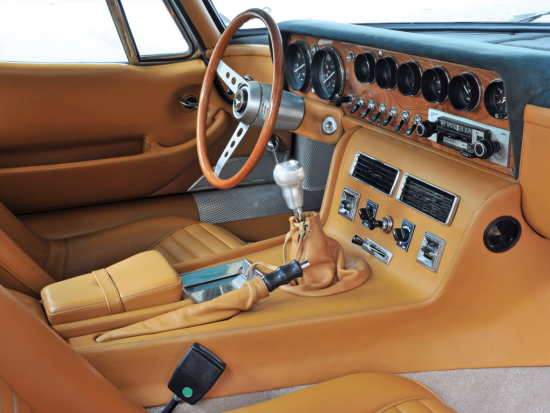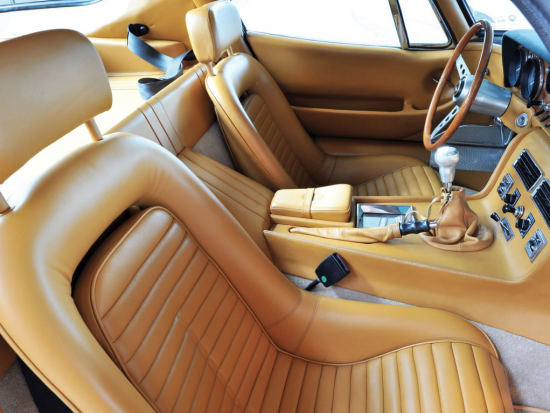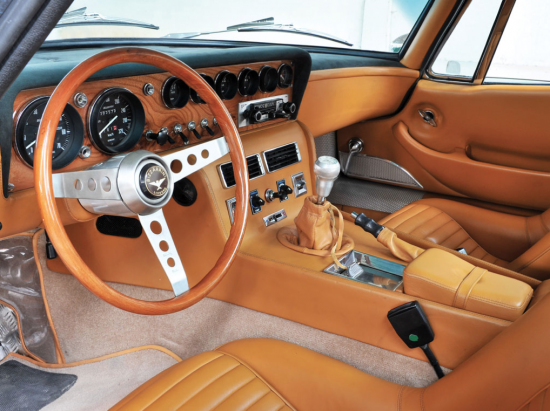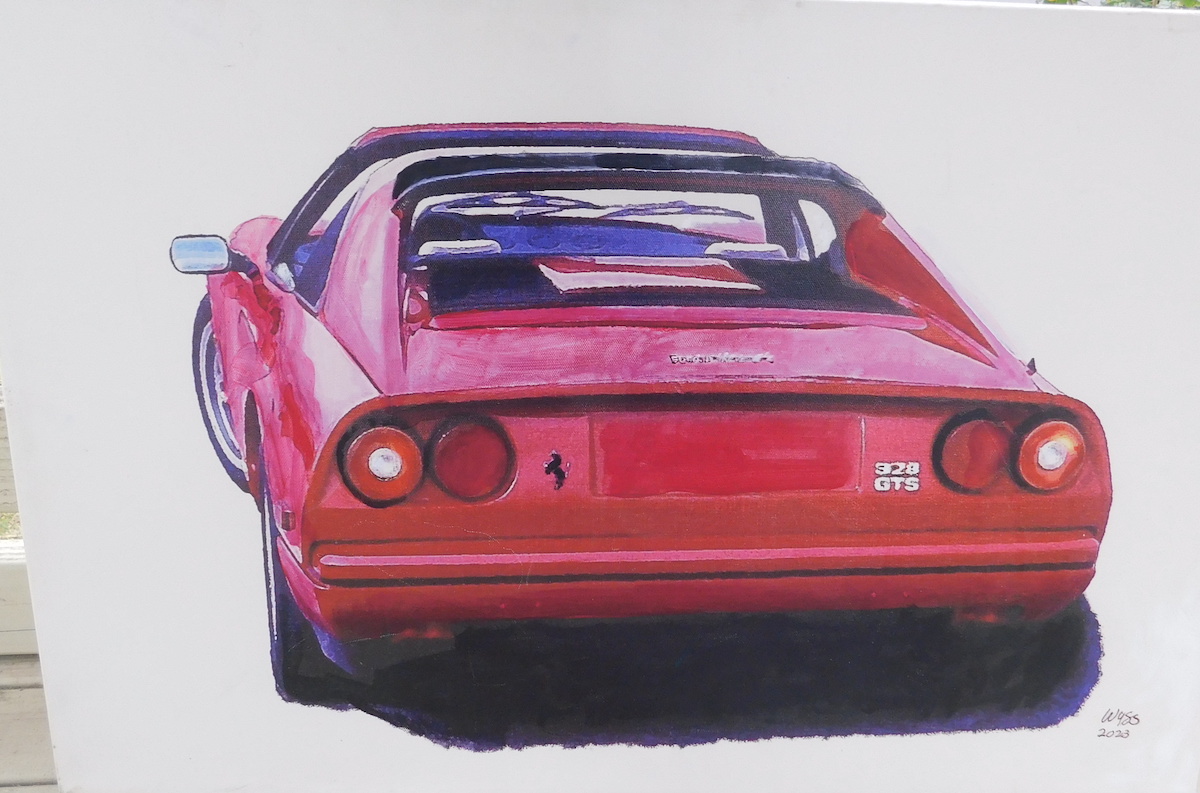by Mike –
My latest gripe about the way collector cars are described by some sellers is the over use of the word “concours” and sometimes “Pebble Beach quality”.
The definition of “concours”
From the Dictionary,
an exhibition or contest, esp. a parade of vintage or classic motor vehicles in which prizes are awarded for those in the best original condition.
From the Pebble Beach Concours d’Elegance web site,
To contend in the Pebble Beach Concours d’Elegance, an automobile must be a well preserved or accurately restored vehicle…
Concours quality restoration
When an auction company, or other sales person, describes a car as “concours quality restoration” or “restored to concours standards” this should mean that not only is everything shiny and in excellent condition but it is restored accurately, or as close to the way the original creator intended as possible.
The latest example of the incorrect use of the word “concours” is this 1968 Bizzarrini 5300 GT Strada Alloy coming up for auction by RM in Monaco.
Not only does RM use the word “concours” incorrectly they contradict themselves in an effort to over promote this unique Bizzarrini GT 5300.
Read and decide for yourself. Everything below in the box is quoted from the RM on line catalog,
* Fully restored to concours standards
* Dramatic Italian styling coupled with American power
* Fascinating history and just three owners from new
* Alloy-bodied exampleHe (Salvatore Diomante) performed a concours-quality restoration to its original specifications and refinished the car in a stunning combination of green over tan leather. Additionally, the owner requested that an air-conditioning system be retrofitted to the car, as well as a restyled rear grille and other minor modifications to suit his tastes; all of which can be easily restored to original specifications if so desired.
In 2004, the car was shown at the Concorso d’Eleganza Villa d’Este, proving that the quality of the restoration was indeed up to international concours standards.
How can a “concours-quality restoration” include “an air-conditioning system” (not available on an original Bizzarrini GT 5300), “restyled rear grille” and “other minor modifications to suit his (the owner’s) tastes”? These are not “original specifications” as RM states.
The “owner’s tastes” have nothing to do with originality or “concours quality”.
Hyperbole
RM contradict themselves in just a couple of sentences by stating the car had a “concours-quality restoration” followed by a list of a few of the custom items (they don’t mention the entire list of custom items).
The interior of this car does not at all resemble an authentic Bizzarrini GT 5300 interior – even the casual observer can see that. The interior must fall under the “other minor modifications” category.
And, in my opinion, just because a car is accepted to any concours d’elegance does not mean it proves that “the quality of the restoration was indeed up to international concours standards”. I am not sure what “international concours standards” means.
A world record price is possible for this Bizzarrini GT 5300
Despite what I have written above this Bizzarrini could set a world record price for the Bizzarrini GT 5300 Strada. The Iso Grifo that RM sold at Amelia Island recently set a world record price and it too was restored by Diomante with almost nothing original.
The estimate is €450,000 – €550,000 ($621,000 – $760,000) (370,000 – 452,000 pounds sterling).
I think this would be a great Bizzarrini GT 5300 to own and drive but it is important for a buyer to know what they are buying and with this Bizzarrini it is not concours condition that is being bought.
Let us know what you think in the Comments.










Mike,
Good points, well made.
Salon Prive in London later this year have a new class for ‘original and unrestored’ cars.
They now claim to be on a level with Pebble Beach and Villa d’Este in the hierarchy of world class concours events.
There is no doubt that the perception of ‘concours correct’ is changing in favour of ‘survivor’ cars over ‘restored cars.’
It will be interesting to see how rigorously they interpret their own description, and how the winner of that category fares against the other Show classes for Best in Show.
Are there any unrestored cars in England with all the rain, humidity and rust?
Mike, one word to sum this up is GREED. Seems that the auction houses are trying to outdo one another in attracting sellers. Since the houses are not regulated in what they can say and how they present a vehicle, anything in the marketing arsenal will do. This behavior is reminiscent of those unscrupulous used car dealers that gave an entire industry a “black eye” in terms of public perception and in the end brought down a whole set of federal and local government regulations.
There is nothing wrong with auction houses to try and sell their listed vehicles for top price and earn tons of commission. After all, at this level both the seller and the buyer are educated enough to understand market values and commission structures. If the auctioneer can get a crowd riled up and pay top dollar for a properly presented car, more kudos to him/her. What I oppose is exactly the issues you are mentioning here – misleading marketing claims and misrepresentation (could be construed as one and the same, except that misrepresentation is more of the sellers’ deed).
Majority of the cars crossing the block are properly represented and I’m not going to paint auctioneers and sellers into the dark corner here. However, the auction houses owe it to their buyers and to their reputations as businesses of integrity to make sure that the car crossing the block is indeed what the seller is representing, especially in te high price segment. All it takes is a one experienced automotive historian and possibly an apprentice to weed through the claims of authenticity. Many records are are readily available via Internet and communications are further simplified by emails. The auction houses need to start policing themselves in what they are presenting before a government steps in to do it for them.
The foregoing is exactly why the Automotive Specialties Group, a subset of the American Society of Appraisers Personal Property discipline, are undertaking a lexicon project. Our goal is to develop a common-usage Thesaurus/Dictionary/catalogue raisonee’ of conformation, fitment, and condition verbiage – and the appropriate
terminology attendant thereto – that will “snap the chaulkline” as concerns what is and what ain’t.
Somebody’s gotta do this. We are out there everyday researching both the basics and intricacies of value and authoring credentialed opinion reports based upon those unearthed facts, comparables and word/term definitions.
There will be no soon answers as the free radical is, “beauty (and value) is in the eye of the beholder (and buyer).”
Thus we undertake this project in our own self-defense to better define terminology that all might see our work product as a credible focal point and authoritative resource.
But, in all of this, it must be remembered that, “he who has the gold (or underwrites either event or enterprise) makes the rules”. Thus different groups/events are gonna have varying rules and decision points.As always, therefore, due diligence – regardless of venue – should be the buyer’s watchword.
Needless to say, I am following this exchange with heightened interest. Thanks, Mike, for launching debate on this subject.
Jon, I concur that the final due diligence is the buyer’s responsibility. I also don’t have an issue with auction houses making profits, significant ones at that as long as its earned legitimately. Representing something for what it’s not and then hiding behind legal mumbo jumbo is hurtful not only to their reputation but to he reputation of the entire industry. It’s a shame because without the big auction houses many buyers would not be able to find their “dream” rides. Unfortunately, as things currently stand, some buyers also find their “nightmares”.
Mike,
while I agree with your questioning of the meaning of the term “concours” quality, I think I can shed some light. Most people seem to simplify the terms meaning to be a high quality of restoration. Most cars at major events are restored to a very high level but are often not restored to original condition. If you are looking for car restored to a very original standard I have found that brand specific events are judged to a higher standard. That being said, I think many customers are looking for a nearly perfect car that has had user friendly upgrades. We may not agree with this use of the term, but I see the meaning changing over time.
Wayne Long
Wayne,
You are right I do not agree.
RM said this,
“Fully restored to concours standards” and “In 2004, the car was shown at the Concorso d’Eleganza Villa d’Este, proving that the quality of the restoration was indeed up to international concours standards.”
This Bizzarrini, while beautiful, is not a genuine restoration. It is like a Chip Foose or George Barris custom car. Not at all a genuine Bizzarrini restoration.
So my question is – what does “Concours Condition” really mean? And what does “international concours standards” mean?
Mike,
I agree with you. If an automobile is restored to original standards, then it should look just the way it did when it left the factory. Having shown several sports cars at Pebble Beach, I want the viewing public to see one of my restorations as if they had be transported back to the time when the car was sold new. I did this with a 1967 AC 428 in 1995, a 1969 Iso Grifo 7 Litre in 1999 and a 1964 ATS 2500 GTS in 2001. The ATS was one of less than 10 automobiles manufactured. I must say, I had to employ a ZF transaxle, since the original ATS transaxle had long since departed. When the judges looked at the ATS, one of them, a former ATS owner, asked me about the transaxle, I told him what had happened and yes, the transaxle was not original. My honesty paid off and we still placed first in class, just like I did with the AC 428 and the Iso Grifo 7 Litre.
Keep up the good work,
David Grant
Good discussion.
Apparently, “Concours” means a generally chromed and accessorised restoration of everything visible.
In many cases, also seems to mean that the hidden internals can be (often are?) criminally under-attended, But that isn’t important, as “concours” also seems to mean that the car is a showpiece, not to be driven other than off, then back on to, the trailer that got it there in the first place
“International concours standard” seems to mean that ‘double-speak’ and ‘forked-tongue’ language and adjectives are in fact, requirements to satisfy the over-hyped, coked-up or methed-up (no, that wasn’t with a lisp) salespeople in the auction houses who mess with truth and reality.
Apologies to those fine and true souls who drive their properly maintained and honestly restored cars often, who then also groom their cars immaculately and make the trips to the events and often get a mention as ‘The Peoples Choice’ or ‘Great example’. To you fine fellows, I doff my hat and bow low and long.
Just my two cents worth.